Author Archive for Charles Clover
With the future of the bluefin tuna in the Mediterranean and the Atlantic likely to be decided in Brussels this week, supporters of The End of the Line’s campaign to reform the management of Europe’s fisheries have written to José Manuel Barroso, President of the European Commission asking him to save the tuna from commercial extinction.
As The Independent reported at the weekend there are moves by Japan and DG Mare, the marine and fisheries directorate of the European Commission, to undermine the ban on international trade in bluefin until stocks recover that has been proposed by France, Britain, Germany, the Netherlands, Austria and Poland.
We, The End of the Line campaign, are calling on President Barroso to show leadership. The letter we have sent is below and we shall add any more prominent signatures as they come in.
19 July 2009
Dear President Barroso
You may be aware that the film “The End of the Line” based on the book by British journalist and author, Charles Clover, has had a tremendous impact in the United Kingdom and elsewhere in Europe following its general release in June this year.
The story is a simple one - the massive public policy failure of fisheries policies around the world and, in particular, highlighting the EU’s own lamentable Common Fisheries Policy. The film describes graphically the plight of the Atlantic bluefin tuna, a magnificent animal now sadly fished almost to the brink of extinction.
The film has alerted the public to the tragedy of the oceans. Your Commission has a chance to show the European public that you are able to take corrective action. On Wednesday 9th September, the Commission is expected to be presented with a choice on the fate of the bluefin tuna.
On the one side, the fate of this animal can continue to rest with the Regional Fisheries Management Organisation, ICCAT. On past evidence this will be a disaster.
The alternative is the option recently proposed by the Government of Monaco and supported inter alia by various Commission services (although not DG MARE apparently) as well as by several Member States.
This would involve the listing of the tuna as an endangered species under Appendix 1 of the Convention on International Trade in Endangered Species, CITES.
The choice calls for your leadership, Mr President. You will be acutely aware that the European public would be outraged if an emblematic species like the bluefin tuna would go extinct on your watch.
We call on you and your Commission to do the right thing and give the tuna the absolute protection it deserves.
Yours sincerely
Greta Scacchi
Stephen Fry
Colin and Livia Firth
Richard E Grant
Sophie Dahl
Emilia Fox
Tom Aikens
Sophie Andrieu
Joanna Lumley
Charles Dance
Fiona Shaw
Elle MacPherson
Zac Goldsmith
Damian Aspinall
Ben Elliot
Ben Goldsmith
Kate Goldsmith
Baron Eric De Rothschild
Laura Bailey
Valeria Golino
Ted Danson
Alan Rickman
Prince Urbano Barberini

President Sarkozy of France has announced his country’s support for a ban on international trade in endangered bluefin tuna before it disappears forever from the sea and our plates.
His initiative was followed quickly by a similar announcement by Huw Irranca-Davies, the British fisheries minister.
The backing of two major EU countries for a ban on the international bluefin tuna trade has instantly given weight and momentum to the campaign by Monaco - and our film, The End of the Line - to have the bluefin listed under the Convention on International Trade in Endangered Species of Wild Fauna and Flora (CITES) next year.
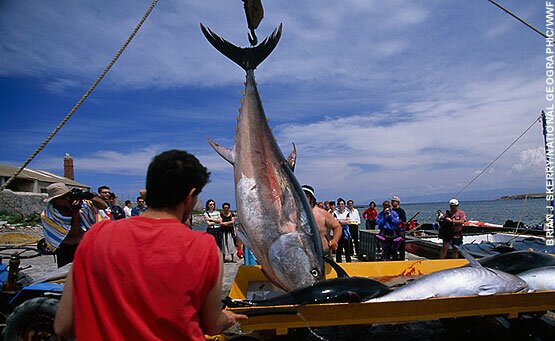
Fishermen haul in a catch of Northern bluefin tuna (Thunnus thynnus) caught with the traditional 'Mattanza' fishing method, Mediterranean Sea
The United States will now be under pressure to respond. Speaking at the close of a national stakeholder consultation on France’s future sustainable fisheries and maritime policy, President Sarkozy said: “France supports listing bluefin tuna on the CITES convention to ban international trade.”
He added: “Ours is the last generation with the ability to take action before it’s too late – we must protect marine resources now, in order to fish better in future. We owe this to fishermen, and we owe it to future generations.” Continue reading ‘Sarkozy takes the lead on saving the bluefin tuna’

This may be a record. Our independent documentary film has run for four weeks in the West End of London, with four screenings a day, and continues to be picked up by London cinemas, including many which originally turned it down.

The End of the Line at the Screen on the Green, Islington, London
It is booked in cinemas around the country until the end of September.
As a writer and not a habitual film-maker, I had no idea how impressive that was, but Christopher Hird, our executive producer, tells me that nobody can remember another UK produced documentary having anything like this success.
Only An Inconvenient Truth had anything like this impact, and it had tens of millions of marketing money behind it that we have not.
What has astonished even us is the way the film has broken out of the usual circle of dedicated followers of the environmental cause and found its way into the consciousness of the public at large.
It has been taken up by the Sun, Hello and Heat magazine, as well as regional and local papers and the entire national press. Continue reading ‘An astonishing month for The End of the Line’

The breeding population of bluefin tuna in the Eastern Atlantic and the Mediterranean has collapsed, in what may come to be seen as one of the world’s most spectacular ecological disasters, according to an independent report.
- The 2008 bluefin tuna dossier - Advanced Tuna Ranching Technologies [pdf of the full report by Roberto Mielgo]
The destruction of stocks of one of the world’s most expensive fish, already recognised as being as endangered as the giant panda, effectively took place in 2007, more than twice the legal catch was taken by Mediterranean fishermen under the eyes of EU and UN-recognised officials, according to the report.
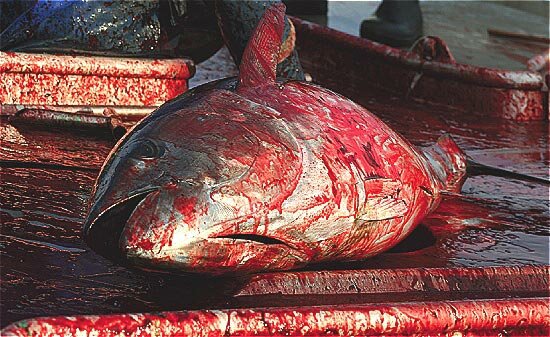
Bluefin tuna image from The 2008 bluefin tuna dossier by Advanced Tuna Ranching Technologies
If the analysis of the size and weight of tuna now passing through the Japanese market is representative of what remains in the sea, according to the report, the EU and other Atlantic nations have presided over disaster comparable to that of the collapse of the blue whale or the Northern cod.
Environmentalists blame the final destruction of what was the largest population of a fish which is known to have been hunted for 7,000 years on a catastrophic failure of governance by the EU and the International Commission for the Conservation of Atlantic Tunas (ICCAT).
Rampant illegal fishing with spotter aircraft, fast power-boats and the full modern hi-tech arsenal of fishing technology has hastened the decline.
A-list diners, including Charlize Theron, Sting and Elle Macpherson signed a letter of protest last week to Nobu Matsuhisa, the world-famous fushion chef, threatening to boycott his restaurants unless he takes the endangered bluefin tuna off the menu.
According to the latest report, released to coincide with World Oceans Day by the independent consultant Roberto Mielgo, 70 per cent of the bluefin tuna in the Japanese market between July 1 last year and May 1 this year were below 90 kilos in weight.
Some 33 per cent of the tunas on the Japanese market were below the legal size of 30 kg when caught – a major indictment of the inspection regime run by Mediterranean countries under the supervision of ICCAT.
Mr Mielgo said: “If this analysis of what is on the Japanese auction markets corresponds to what is left in the sea, we are in deep trouble. It means the adult bluefins are no longer there. If that is what is at sea, the stock will not recoup.
“My view is that the stock collapsed in 2007 as a result of the 2007 fishing season in which 61,000 tons of bluefin were caught. The fishery should have been closed in 2007.”
The 61,000 tons recorded in official catch figures in 2007 was twice the legal quota agreed by EU nations and ICCAT, four times what scientists advised was responsible and six times what ICCAT’s own scientists said was needed for the recovery of the stock.
Ten years ago, the majority of bluefin tuna in the Japanese market were medium-sized mature adults of 120 kgs or more and the stock structure wholly different to what it is now. Now a third of it is below the minimum landing size and causing concern even among Japanese tuna traders who dislike selling small fish.
Mr Mielgo’s report concludes: “The massive presence in the Japanese market of juvenile bluefin tunas having been illegally caught and farmed points to the failure of current control schemes, including the credibility of observers filling in caging declarations.”
Mr Mielgo is a tuna farmer turned whistle-blower. The report by his consultancy, Advanced Tuna Ranching Technologies, goes even further than trends presented earlier this year by WWF using official figures which showed that the population of breeding tuna in 2007 was only a quarter of that 50 years ago.
According to WWF’s analysis, the bluefin breeding population will disappear by 2012 under the current fishing regime. It called for the immediate closure of the fishery.
Mr Mielgo’s report says the age-profile of tunas on the Japanese market “is consistent with the hypothesis of an on-going collapse of the breeding population of this stock.”
He added: “It’s not that I am a pessimist. There is no way this population is going to pick up. Again, I hope I am wrong. The fish are not there.”
Dr Sergi Tudela, head of fisheries for the Mediterranean, said: “Our position in April, based on ICCAT data, is that the spawning stock will have been wiped out by 2012.
“This new data is a further indication of what we said then, which is that the spawners are disappearing. The reproducing stock is in serious trouble. This shows the bluefin is in dire straits.”
Mr Mielgo is featured in the film, The End of the Line, which has its national public premiere in 50 British cinemas tomorrow.

Earlier this month, I went to Brussels for a private screening of our film, The End of the Line, and debated the sad state of Europe’s fisheries with Joe Borg, the Commissioner for Maritime Affairs and Fisheries.
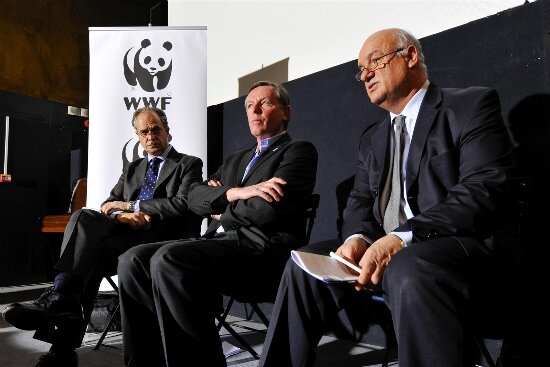
Charles Clover, Tony Long of WWF and Joe Borg, Commissioner for Maritime Affairs and Fisheries, debate Europe’s fisheries policy after a WWF screening of The End of the Line
The screening had been organised by WWF for members of the European Commission and country representatives ahead of the publication of the Green Paper on the reform of Europe’s fisheries policy last week.
I was surprised and impressed by two things. First, the openness and dedication with which Commissioner Borg trotted along and watched an 82-minute film and debated its conclusions, especially since these are even more damning about Europe’s management of its fish stocks than the Commission’s own Green Paper – which admits that 90 per cent of Europe’s fish stocks are overfished.
Continue reading ‘Nice reforms Mr Borg, but aren’t you missing something?’

Europe’s fishing policy has failed and nearly nine tenths of its fish stocks are overfished, the European Commission has admitted.
The Commission published a Green Paper proposing radical reforms of the Common Fisheries Policy (CFP) and began an open debate on the proposed measures which will last until the end of this year.
Among the proposals are:
- A ban on the “discarding” of under-sized and unmarketable fish at sea.
- Making the ecological sustainability of fish stocks the paramount objective of European policy, on which economic viability depends, rather than a factor to be weighed off against the survival of the fishing industry, as it is at present.
- Devolving decisions on the management of fisheries closer to the people they affect.
Continue reading ‘EU admits nine tenths of fish stocks are overfished’

What were thought of as certainties can fall apart in the light of new circumstances, new thinking.
For years we have been told that the Omega 3 fatty acids from oily fish such as salmon, tuna and mackerel are good for the heart and brain.
Now, some of the people who proved that the world’s fish catches were not rising but falling - a critical milestone in this century’s thinking - have produced a report that shows that the evidence for the beneficial effects of Omega 3s is somewhat less impressive than one might think.
The study actively challenges dietary advice that we actually should be eating more oily fish.
It says that people in the Northern hemisphere who eat a balanced diet may be getting enough Omega 3s anyway but people in the Southern hemisphere are having their essential proteins and fish oils stolen from them by diet faddism in the North.
Oily fish can actually be bad for overweight or unhealthy people with heart problems, it says.
Was the fad for Omega 3s perhaps just a marketing strategy worked up by the fishing industry? That’s going too far, but it certainly looks as this dietary obsession is something we should be looking at a whole lot more critically now we know that wild fish stocks are in trouble almost everywhere.
Policies can be skewed by vested interests - including our own perceived health interests.
In fact what the human race needs are balanced policies that promote healthy people and healthy wild fish populations, able to feed a human population that will rise by a third over the next half century.
That is what we should be planning for, together with ways of producing Omega 3 fatty acids from vegetables and algae, to take the pressure off fish.
In the meantime, we may actually need to eat less of certain fish - salmon and tuna for instance - rather than more as the dieticians have been calling for.

Hungry sharks have attacked three people in the past three weeks off Sydney, Australia.
One of the explanations offered by the BBC is that cleaner waters and a ban on commercial fishing, which has attracted more fish to the area, could be responsible for luring the oceans’ big predators closer to Sydney’s beaches and harbour.
That is an extraordinarily cynical explanation, if you think about it, and one the BBC should be ashamed for reporting.
If you follow the logic of the Australian source quoted by the BBC, it would be safer to go polluting the sea until the water turns brown and to have fish exterminated within miles of the shore so that at least you aren’t attacked by sharks. Bruce, do me a favour.
There is a much more plausible explanation contained in the two-yearly report on the state of the world’s fish stocks published today by the UN Food and Agriculture Organisation (FAO).
The report shows that the number of the world’s fish stocks ranked as over-fished, depleted or fully exploited increased to 80 per cent – a rise of three per cent in two years.
The only sensible explanation for this is the world’s fishing fleets remain out of control and politicians are unaware or unwilling to do something about the problem.
Check out another report today, Hungry Oceans: What happens when the prey is gone?, compiled from scientific sources by the environmental group Oceana. This shows that scientists around the world are reporting ocean predators emaciated from lack of food, vulnerable to disease and lacking the energy to reproduce.
Scrawny dolphins, whales, tuna and bass have been reported along coastlines around the world.
At the same time, we continue to hunt their prey, the small fish such as herring, menhaden, anchovy and sand eel which the major predators depend on, to provide feedstock for the fast-growing fish farming industry. We have forgotten to leave enough fish in the sea for predator fish.
Isn’t lack of food the most likely explanation for the strange behaviour of sharks off Sydney?
And isn’t the creation of larger areas, offshore, where the bounty of the sea can recover a more plausible way of solving the problem than allowing the seas off Sydney to get polluted again and over-fishing to resume?

Well, we are just back from the Sundance Film Festival and what it all means is only just beginning to sink in. The audiences loved our film, which warns that this may be the end of the line for fish in the world’s oceans, unless we take care. All our screenings were packed and followed by spirited Q&As.

Rupert Murray is interviewed for Italian television
Perhaps the most gratifying were the two screenings in Salt Lake City because the audiences were made up of members of the public - one was before 200 High School children who asked the best questions of the festival.
Number one, from a 16 year old boy, “Will there be fish to eat when I’m a grandfather?” Good question.
Being so close to the subject for so long, it was easy for us to forget just how shocking and how surprising the story of what is going on in the sea is to most people.
Even the questioner who said he knew most of the facts fell silent when we told him that in the week we arrived there was a piece in Science linking the depletion of fish in the world’s oceans with global warming, and confirming our worst predictions about the sea.
Ours was a very big subject indeed. We hope we have done it justice. Certainly our audiences thought we did.
What many people who saw the film commented on was the fact that there was an optimistic ending: we can do something about the destruction of the oceans if we act now. Continue reading ‘Back home after the genius of the Sundance Film Festival’

There have been moments during the production of The End of the Line when we have felt that someone up there wanted this film to be made and to be seen by as many people as possible.
It happened again as we arrived in Park City, Utah, for the Sundance Film Festival.
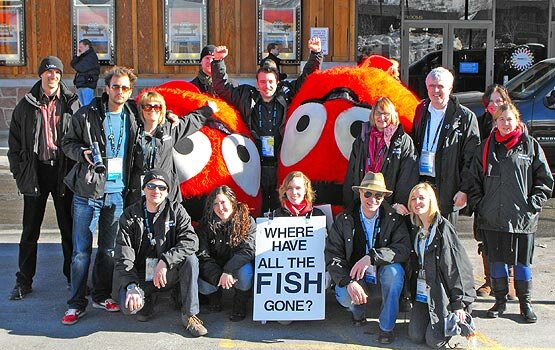
The End of the Line team after the world premiere
Jeff Hutchings, a professor from Dalhousie University, Canada, travelled here at his own expense just to be part of the excitement and see himself in the film.
On arrival he handed us a cutting of a story from Science: the first proof of a link between global overfishing and climate change.
Continue reading ‘World premiere of The End of the Line’

When the history of the last half century is written, will we think that governments, scientists and environmental leaders identified the right global problems and got to grips with them, as the human population doubled, and looked like doing so again?
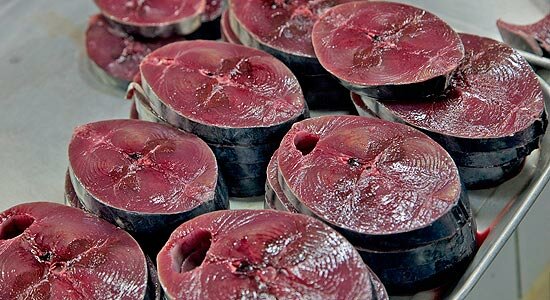
Fish steaks - Rampant, uncontrolled fishing is already pushing whole species, such as the magnificent bluefin tuna towards extinction
Or will we think that huge problems emerged on our watch while reason slept?
The inconvenient truth about the sea, which covers 70 per cent of the Earth, is that arguably the worst impact upon it so far – if you study the latest scientific assessments - has been caused by the mundane pursuit of human food and not by global warming or acidification, major threats though these are to our common future. Continue reading ‘The inconvenient truth about the sea’

![]()









